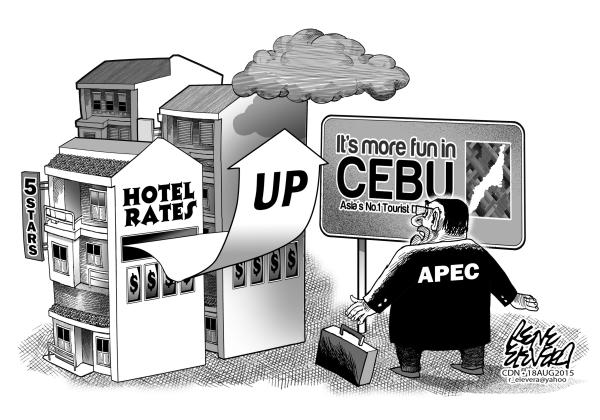
Ambassador Marciano Paynor Jr. sent a low-key yet strong signal to Cebu’s officials who wanted to demand lower rates from at least three luxe hotels designated as venues for meetings of delegates of the Asia-Pacific Economic Cooperation (APEC) meetings that start next week.
“I understand why it was raised, in the desire that it can still be lowered. But at this point, all negotiations have been finished because we have been negotiating since six or seven months ago,” Paynor told reporters.
As director general of the APEC National Organizing Committee, Paynor’s appeal to Cebu officials to set aside the issue first, at least after the APEC meetings are held, will certainly be heeded if only to show visitors that Cebu has a united front in hosting the event.
Paynor said the rates were already spelled out in a circular sent out by his office to delegates ahead of the APEC meetings in Cebu. Delegates can choose, he said, where to stay from a list of 11 accredited hotels.
Paynor moved quickly to defuse a controversy that has at its center a valid issue.
Here is Cebu, moving to build its brand as a fun, tourist-friendly destination and a wonderful opportunity to leave 3,300 delegates from 21 APEC member economies with a positive, lasting impression.
Why should one of the first impressions curdle over the fact that rates for a captured market of mostly government delegates rise to double or more the room rates during an otherwise low season of September?
When can “expensive” be allowed to rise to “exceesive”?
Not all hotels in Cebu, thankfully, took advantage of the APEC season with a 120 percent increase in published rates.
When asked about the increase, international hotels addressed their explanation to Paynor as a rate-fixing matter hinged on market forces of demand and supply.
In a global market, which is exactly what APEC meetings are are designed to discuss, this is the way of the world.
But there’s another dimension to world trade that Cebu tourism is sorely aware of. The need to be competitive globally requires this island province to stand out, to be more appealing and affordable to visitors. The grand welcome that APEC 2015 is rolling out in selected cities of the Philippines calls on Cebu to be a premier host.
Residents are called on to bear more intense traffic congestion when VIP convoys speed by. Cebuanos are asked to stay home and avoid the streets so that roads would be less crowded during APEC. We are asked to be our usual hospitable selves plus more.
It’s a call for some sacrifice. At its most basic, it’s a call for patriotism. If only hotel players viewed restraint in rates as a long-term investment in Cebu’s brand and did not transact APEC as an opportunity in the normal course of doing business.